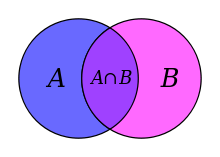Infinite set
In set theory, an infinite set is a set that is not a finite set. Infinite sets may be countable or uncountable. Some examples are:
- the set of all integers, {..., -1, 0, 1, 2, ...}, is a countably infinite set; and
- the set of all real numbers is an uncountably infinite set.
Properties
The set of natural numbers (whose existence is postulated by the axiom of infinity) is infinite. It is the only set that is directly required by the axioms to be infinite. The existence of any other infinite set can be proved in Zermelo–Fraenkel set theory (ZFC) only by showing that it follows from the existence of the natural numbers.
A set is infinite if and only if for every natural number the set has a subset whose cardinality is that natural number.
If the axiom of choice holds, then a set is infinite if and only if it includes a countable infinite subset.
If a set of sets is infinite or contains an infinite element, then its union is infinite. The powerset of an infinite set is infinite. Any superset of an infinite set is infinite. If an infinite set is partitioned into finitely many subsets, then at least one of them must be infinite. Any set which can be mapped onto an infinite set is infinite. The Cartesian product of an infinite set and a nonempty set is infinite. The Cartesian product of an infinite number of sets each containing at least two elements is either empty or infinite; if the axiom of choice holds, then it is infinite.
If an infinite set is a well-ordered set, then it must have a nonempty subset that has no greatest element.
In ZF, a set is infinite if and only if the powerset of its powerset is a Dedekind-infinite set, having a proper subset equinumerous to itself.[1] If the axiom of choice is also true, infinite sets are precisely the Dedekind-infinite sets.
If an infinite set is a well-orderable set, then it has many well-orderings which are non-isomorphic.
